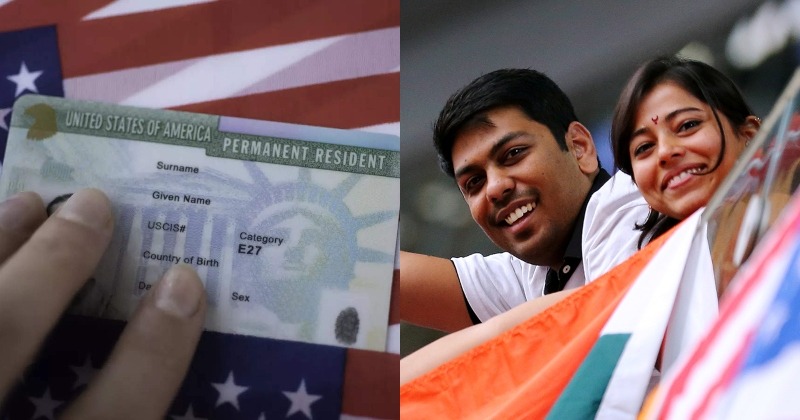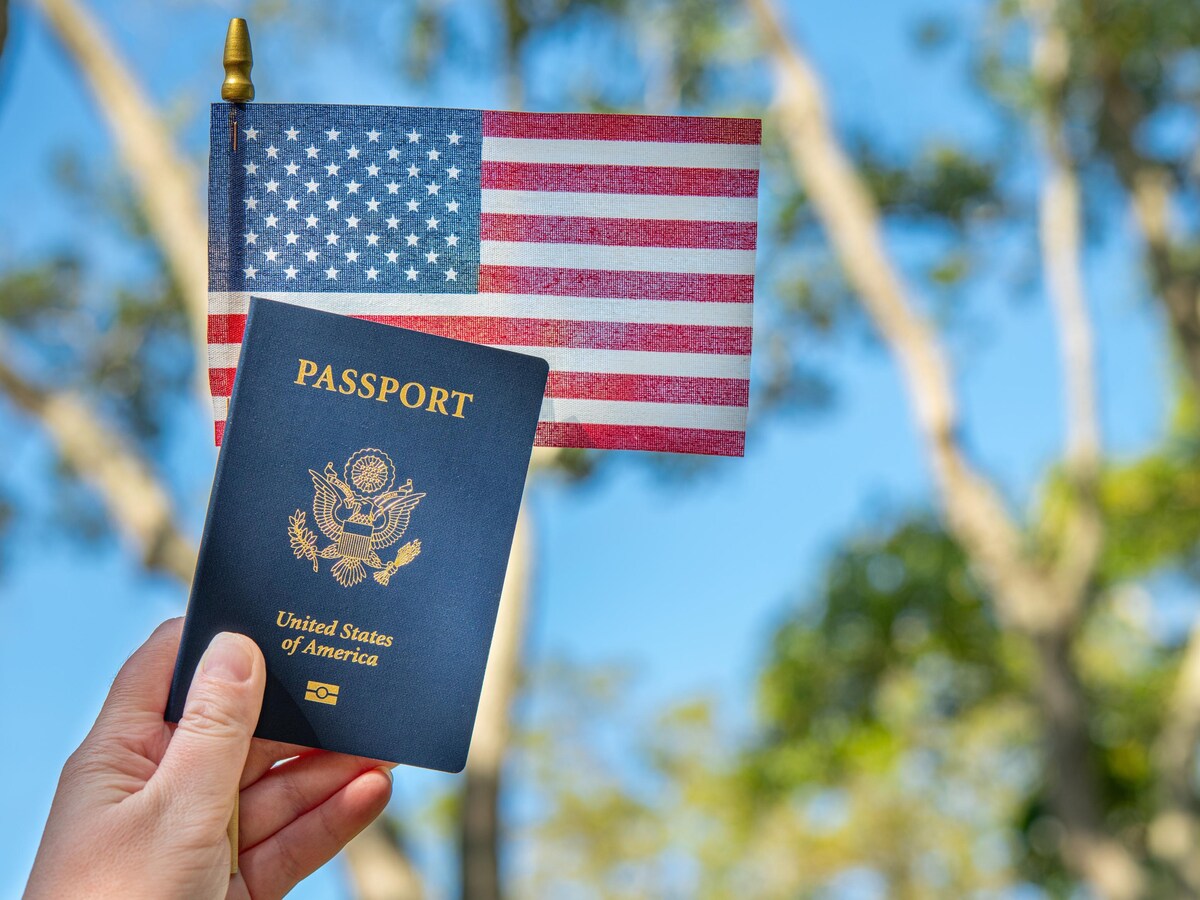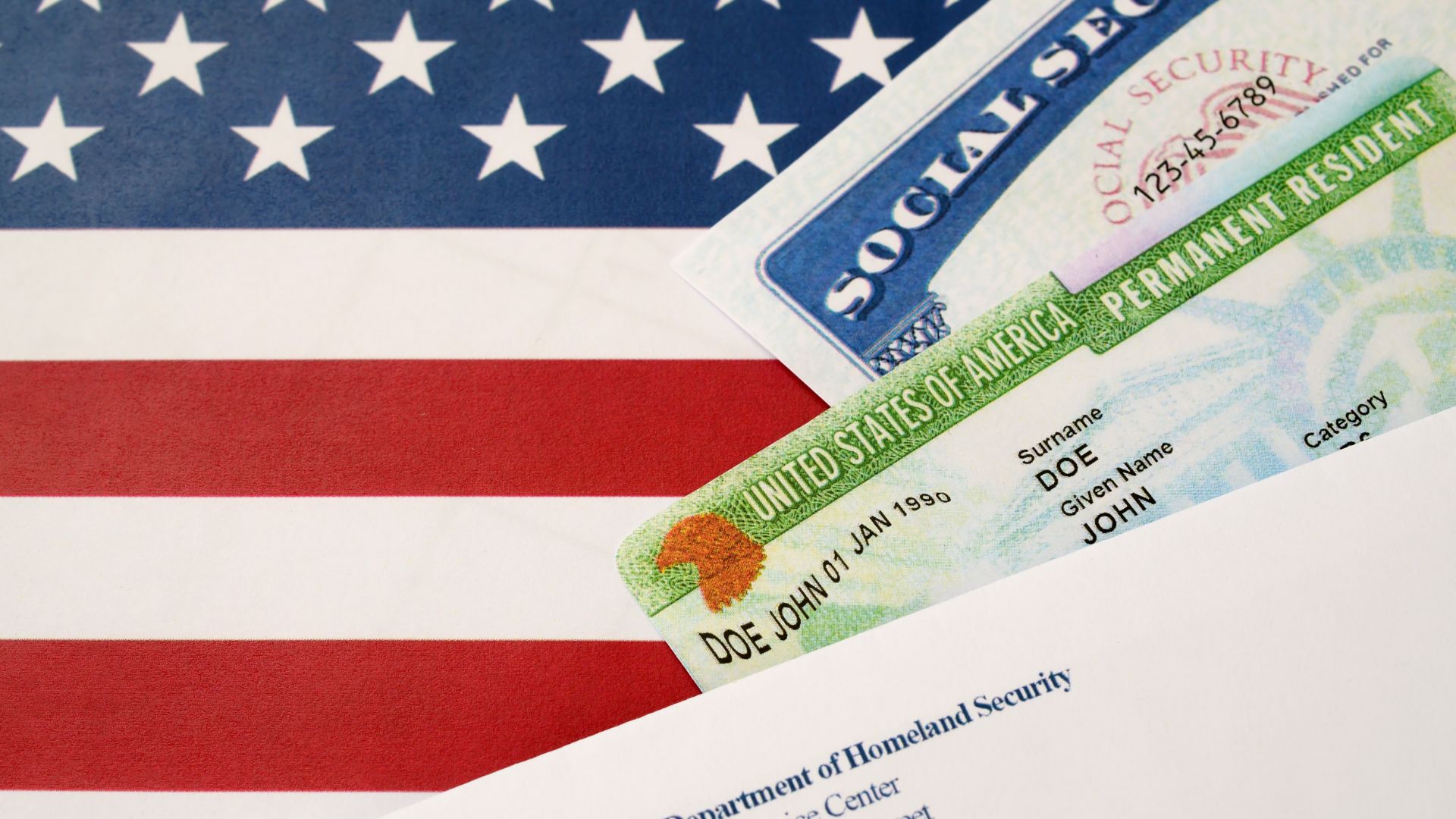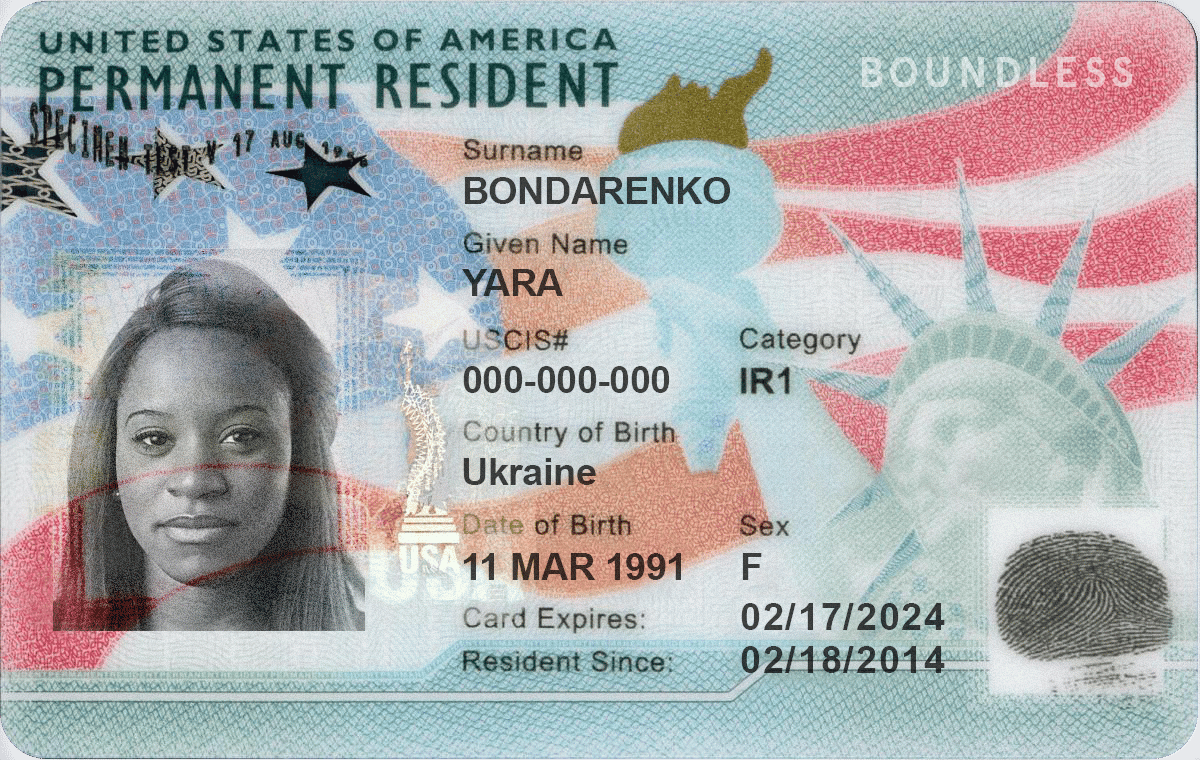
How to Apply Online for a Green Card in the USA (2025 Guide)
Get a Green Card
Are you eligible to apply?
U.S. immigration laws provide a variety of ways for people to apply for a Green Card. The eligibility requirements may vary depending on the immigrant category you are applying under. Go to our Green Card Eligibility Categories page to see all the possible categories you can apply under and what the eligibility requirements are.
Being Sponsored for a USA If you already have an approved immigrant petition and an immigrant visa is available, file Form I-485, Application to Register Permanent Residence or Adjust Status with USCIS, or
If you do not currently have an approved immigrant petition, check the eligibility requirements for your Green Card category to see if you can file the petition and the Form I‑485 together at the same time (this is known as concurrent filing).
Go to our Adjustment of Status page for more information about the process of applying for a Green Card in the U.S.Green Card
Most people who apply for a Green Card will need to complete at least two forms—an immigrant petition and a Green Card application (Form I-485). Someone else usually must file the petition for you (often referred to as sponsoring or petitioning for you), although you may be eligible to file for yourself in some cases. Here are the most common forms:(+49 69 76 75 77 85 26). We offer our services wordwide.
U.S. Green Card – Requirements, Application, Tax Implications
Contents on this page: Requirements for applying for a Green Card
Reentry permit for Green Card holders
Tax implications of a Green Card
Employment-based vs. family-based Green Cards
Employment-based Green Cards
Video: EB-5 Visa - U.S. Green Card for Immigrant Investors
Family-based Green CardsU.S. Green Card services worldwide provided by our experienced attorneys
U.S. Green Card categories
For decades, the United States Permanent Resident Card – better known as a "Green Card" – has been one of the most sought after resident permits in the world. A Green Card grants its holder the right to live permanently in the United States (wherever one chooses) and to be self-employed or work for any employer. And, in contrast to employment-based nonimmigrant visas, once you have an employment-based Green Card, you are no longer restricted to working for the company that sponsored your application for a Green Card.
In many cases, employees residing in the United States during a work assignment are very interested in applying for a Green Card. Employers who support such employee requests retain their best and most experienced employees while giving them an incentive to remain at their U.S. location indefinitely.
Green card holders may apply for U.S. citizenship
Green card holders can obtain U.S. citizenship after 3 to 5 years. However, if you want to retain your current citizenship, be sure to review any citizenship retention requirements prior to applying for U.S. citizenship.
Our experienced U.S. visa law attorneys can advise you on all aspects of how to apply for a Green Card. And our services range from an initial consultation to an evaluation of the tax implications of an application for U.S. citizenship. We offer our services personally in Germany or worldwide via phone/video call.
Requirements for applying for a Green Card
Green cards confer numerous rights but also come with certain responsibilities: Holders of a Green Card must move to, and permanently live in, the United States. Otherwise the Green Card may be lost.
Travel outside the United States for less than 6 consecutive months is generally unproblematic. Stays abroad for more than six consecutive months but less than one year can cause problems for Green Card holders when they wish to reenter the United States. In such cases, it is not unusual that a U.S. Customs and Border Protection officer will ask questions and demand documents proving ongoing intent to live in the United States permanently.
If a Green Card holder has stayed outside the United States for more than one year, she will generally have to apply for a special Returning Resident Visa. And said Returning Resident Visa will be issued only if certain requirements are met – including, most importantly, clear evidence of a continuous and unbroken intent to maintain U.S. residence.
Reentry permit for Green Card holders

If, in advance of your travel outside the United States, you already know that you will be staying abroad for an extended period, you should consider applying for a so-called reentry permit. This allows you to stay outside the United States for up to two years without having to obtain a returning resident visa. But even if you have a reentry permit, you should be prepared to explain and justify your extended stay abroad when returning to the United States.
Tax implications of a Green Card
Before obtaining a Green Card, one should also consider the tax implications, both under U.S. tax law and your home country's tax law. If you have a Green Card, you must generally file a U.S. tax return regardless of whether you are residing inside  or outside the United States.
or outside the United States.
After receiving a Green Card, some consider the option of abandoning their Green Card by filing Form I-407. One reason to formally abandon Green Card status would be that one has moved from the U.S. to another country and no longer has any intent to return to the United States. However, abandoning a Green Card can have signification tax implications that should be reviewed prior to any abandonment.
You can become a permanent resident in several ways, including:
- sponsorship by a family member or U.S. employer;
- refugee or asylee status or other humanitarian programs; or
- individual filing
Permanent Resident (Green) Card and immigrant visas
Learn about the Diversity Visa Lottery and other ways to apply for an immigrant visa. Find out how to get, renew, or replace a Green Card and become a permanent resident.
Apply for an immigrant visa
Learn about family-based, fiancee, and work visas and how to apply for each. Discover the Diversity Visa Lottery.
How to get a Green Card
Learn how to get a Permanent Resident (Green) Card, whether inside or outside the U.S.
How to renew or replace your Permanent Resident Card (Green Card)
Learn how to renew, correct, or replace your Permanent Resident Card (Green Card) using Form I-90. Calculate the cost. And find out how to change your address with USCIS.

Work in the U.S. with a work permit (EAD)
As a nonimmigrant visa holder, you may be able to work in the U.S. temporarily with a work permit (Employment Authorization Document or EAD). Learn if you qualify and how to apply.
Refugees and asylum
Learn how to seek refuge or asylum in the U.S. Also find U.S. embassies around the world.
Two of the most popular Green Card categories are employment-based and family-based Green Cards. Applications for employment-based Green Cards are generally filed by a U.S. employer, who submits Form I-140, Immigrant Petition for USA Worker. Applications for family-based Green Cards are filed by either U.S. citizens or by U.S. Green Card holders, who submit Form I-130, Petition for Alien Relative.
There are, however, a few other important Green Card categories:
Thanks to the so-called EB-5 Immigrant Investor Program, certain investors are also eligible to apply for a Green Card.
Individuals with extraordinary abilities may be allowed to self-petition for a Green Card under category EB-1 even without an offer of employment.
Individuals belonging to an occupational category that is in the United States' national interest may be eligible to apply for a category EB-2 Green Card without the support of an employer.
For all other individuals, participating in the Green Card lottery may also be an option.
Employment-based Green Cards
The number of employment-based Green Cards is subject to a quota, which means that only a limited number of Green Cards of this categories are issued per fiscal year. If, in one category, more applications are received than there are Green Cards available, the excess number of applications will be put on a waiting list, i.e. the applications are not rejected but will be processed at a later time.
Generally, employment-based Green Cards require an employment offer. There are two exceptions. First, the categoryEB-1 (workers with extraordinary ability) does not require an employment offer but instead requires only an intent to continue to work in the area in which one has demonstrated extraordinary ability. Second, workers in the category EB-2 are exempt from the employment offer requirement if they can show that their proposed employment would be in the United States' national interest (the so-called “national interest waiver” or “NIW”).
The potential U.S. employer will also generally be required to show that he cannot fill the position with a U.S. citizen (labor certification). Only the categories EB-1 (all sub-categories), EB-2 (provided the applicant's proposed employment is in the United States' national interest), EB-4, and EB-5 are exempt from this requirement.
U.S Employment-based Green Cards are divided into the following sub-categories:
USA workers with extraordinary abilities (achievements must be recognized at national or international level)
outstanding professors and researchers
multinational executives and managers
advanced degree professionals: Individuals with an occupation for which a U.S. bachelor's degree is a minimum requirement and who have a higher degree than a U.S. bachelor's degree (or a foreign equivalent degree, like a master's or doctoral degree) or a bachelor's degree plus no less than 5 years of work experience.
persons with exceptional ability: Individuals who are able to show exceptional ability in their specialty (national recognition sufficient)
professional workers: Individuals, whose occupation normally requires no less than a U.S. bachelor's degree, and individuals, who have earned such U.S. bachelor's or a foreign equivalent degree
skilled workers: Individuals, whose occupation requires at least 2 years of training
unskilled workers: Individuals, whose occupation requires no such training
USA members of religious denominations or faith communities, who wish to carry on the vocation of a religious worker (pastor, priest, etc.)
individuals who plan to invest one million U.S. dollars in an existing or a newly founded enterprise in the United States and thereby plan to create ten permanent full-time jobs. If the enterprise is located in an economically weak region, an investment of half a million U.S. dollars will be deemed sufficient.
Video: EB-5 Visa - U.S. Green Card for Immigrant Investors

Family-based Green Cards
Except for the IR category of immediate relatives, the number of family-based Green Cards available is also subject to a quota, which means that only a limited number of Green Cards are issued per fiscal year, which causes "excess applications" not to be processed immediately but to be placed on a sort of waiting list.
Family-based Green Cards are divided into the following categories:
IR category (immediate relatives) for immediate relatives of U.S. citizens
IR-1 for spouses
IR-2 for unmarried children under the age of 21
IR-3 for orphans adopted abroad
IR-4 for orphans adopted in the United States
IR-5 for parents of U.S. citizens who are at least 21 years old
F category (family preference relatives) for certain other relatives of U.S. citizens or, in some cases, Green Card holders
F1 for unmarried children of U.S. citizens who are 21 years old or older
F2A for spouses and minor children of Green Card holders
F2B for unmarried sons and daughters (21 years of age or older) of Green Card holders
F3 for married sons and daughters of U.S. citizens
F4 for brothers or sisters of U.S. citizens who are at least 21 years old
U.S. Green Card services worldwide provided by our experienced attorneys
U.S: Green Card experts advise worldwide
Have you decided to apply for a Green Card? If you would like our experienced attorneys to assist you with your Green Card application, we would be pleased to provide comprehensive advice on all aspects of Green Card applications and assist you through all steps in the process. In addition to advising you on visa law and checking whether or not you may keep your current citizenship, our attorneys can help you evaluate the tax implications of your U.S. naturalization.
Your contact partner is Attorney Thomas Schwab (German Attorney at Law). Please do not hesitate to contact us at any time if you wish to make an appointment for a consultation meeting with one of our experts by e-mail (info@visum-usa.com)
General Application Process
The steps you must take to apply for a Green Card will vary depending on your individual situation. However, here is the general application process that most applicants will go through:
Someone usually must file an immigrant petition for you (often referred to as sponsoring or petitioning for you). In some cases, you may be eligible to file for yourself.
After USCIS approves the immigrant petition, and there is a visa available in your category, you file either a Green Card application with USCIS or a visa application with the U.S. Department of State.
You go to a biometrics appointment to provide fingerprints, photos, and a signature.
You go to an interview.
You receive a decision on your application.
If Your Green Card Application Is Pending with USCIS
If you already submitted a Form I-485, Application to Register Permanent Residence or Adjust Status, and your case is pending with USCIS, go to our While Your Green Card Application Is Pending with USCIS page for more information on checking your case status, updating your address, and making appointments with USCIS.
How to Track Delivery of Your Green Card, Employment Authorization Document (EAD), and Travel Document
Sign up for a Case Status Online account to get automatic case updates, including your U.S. Postal Service (USPS) tracking number when we mail your card or travel document.
Register for Informed Delivery through USPS to get daily images of mail being sent to you. With Informed Delivery, you can:

Automatically track the packages you're expecting
Set up email and text alerts
Enter USPS Delivery Instructions for your mail carrier
If your USPS tracking information shows your package was delivered but you have not received it, contact your local post office immediately. Remember, we will mail your card or travel document to the address you provided on your application (unless you told us to mail it your representative on Form G-28, Notice of Entry or Appearance as Attorney or Accredited Representative).
If your mailing address changes after you file your application, you must update your address with USCIS and USPS as soon as possible. We recommend you use the USPS Look Up a ZIP Code tool to ensure that you give USCIS your full address using the standard abbreviations and formatting recognized by USPS.
If you don’t update your address promptly, your case could be delayed, your document(s) could get lost, and you may need to reapply and pay the fee again.
If You Already Have a Green Card
If you already have a Green Card, go to our After a Green Card is Granted page for more information on travel, renewing a card, and your rights and responsibilities as a Green Card holder.
A Green Card holder is a permanent resident that has been granted authorization to live and work in the United States on a permanent basis. As proof of that status, U.S. Citizenship and Immigration Services (USCIS) grants a person a permanent resident card, commonly called a "Green Card." USCIS announced that, as of Jan. 20, 2025, officers would no longer issue any Requests for Evidence (RFEs) or Notices of Intent to Deny (NOIDs) related to the COVID-19 vaccination. On March 11, 2025, the Centers for Disease Control and Prevention (CDC) updated their Technical Instructions for Civil Surgeons to remove the COVID-19 vaccination from the list of required vaccinations for aliens seeking admission as immigrants. Therefore, documentation of having completed the COVID-19 vaccination is not required for any immigration medical examinations associated with adjustment applications pending on or after Jan. 20, 2025. Until USCIS updates Form I-693, Report of Immigration Medical Examination and Vaccination Record, civil surgeons can either cross out the COVID-19 section or write “N/A,” and if the alien meets all the vaccination requirements, mark “Applicant completed vaccination requirements or may be eligible for blanket waivers as indicated above.”
Posted on 2025/06/20 10:04 PM

